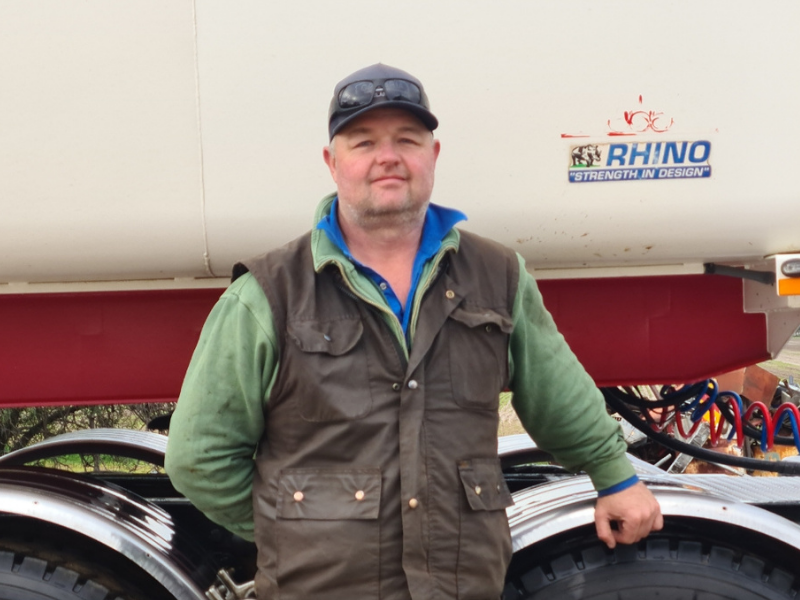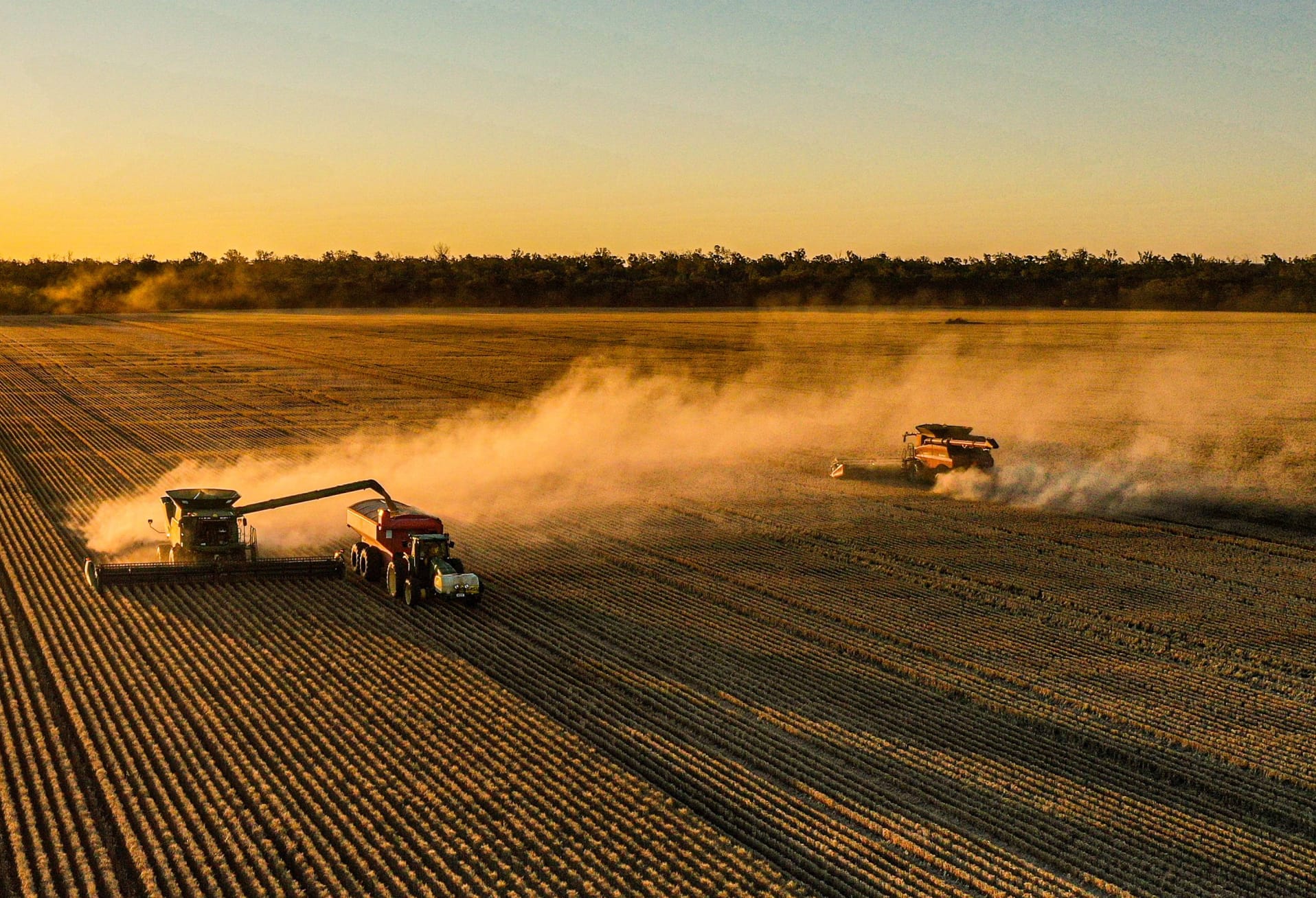We recently caught up with sixth generation Gre Gre North farmer Jason Barratt.
Tell us about yourself.
I grew up on my family farm at Gre Gre North. I completed VCAL at school and as soon as I could, finished school and got outdoors! I began an apprenticeship with Rocky [Greg] Baldwin at Gre Gre North. His operation is a little different to most as he rehabilitates racehorses as well as running sheep and cropping. From there I worked as Parts Interpreter at AgriMac St Arnaud [now O’Connors] and for the better half of ten years, worked with Pete and Billy Knights on their farm at Gre Gre North.
I wanted to see how others did things on farm before coming home to the family farm. Plus, with two younger brothers on the farm there wasn’t really room for me.
In 2016, my two brothers—William and Chris—and I purchased 500 acres and I started the transition back to full-time farming. Pete Knights helped with machinery. He’d say “we’re close to you, we may as well swing it in and harvest yours too”.
We were basically weekend farmers with William working on the old man’s farm during the week and Chris working around his shearing commitments.
Three years ago, we were given the opportunity to lease another 1000 acres. It was then I decided to start farming full time.
This year we are share farming 2000 acres while also farming and managing the old man’s [Michael] which is 1200 acres of crop and 1000 fine wool merino sheep.
Mum [Joan] and Chris manage the sheep.
Overall, our soil type is mainly light, with mixed loam and sandy with a little heavy ground.
My brothers and I do buy in merinos and cross them to sell crossbred lambs. As my parents transition to retirement, we will take on their flock.
What do you love about farming?
I love growing things, being in the outdoors and being your own boss. If you make a mistake, you only have yourself to blame. I enjoy working with my brothers and family. I also enjoy our community: Traynor’s Lagoon/Gre Gre North. We all stick together, particularly with the renewable energy talks at the moment.
How did your sowing program go this year?
It all went in, and in dry. Everything is out of the ground and growing now. It’s probably about a month behind what we would like it to be and it’s gotten cold now which has further slowed growth.
Some of the crops didn’t go in as well, some of the hay we had to roll to knock the clods down as it came up a bit rubbly.
What are you currently up to on the farm?
I’m a little behind with my spraying now as we have been trying to get it in between the wind and rain events. I’m busy trying to get across the beans and canola to spray out the grasses.
We have been lucky we haven’t had any frosts [at the time of writing] which add another level of difficulty.
How do you make nitrogen input decisions?
Our agronomist advises us on our nitrogen inputs. They take soil tests each year. All our canola, wheat and barley has had one application of nitrogen and now we will wait and see what the season does before applying more.
What were your biggest challenges last year?
Entering harvest with wet weather pulled us up. In some paddocks we did find wet spots that we had to come back to it. We never got bogged but we had to be careful.
We did get caught with rust too. This year I hope to apply fungicide earlier and monitor carefully.
What do you see your biggest challenge for 2024 will be?
Monitoring the rain and the other is heat stress. I’d like it to stay mild and not come in hot as it will cut the yield down.
Our beans have been very staggered in germination and canola too. The rest went in crispy-dry and germinated on the rain we had.
How do you address farm safety on your farm? What is your message when it comes to safety?
- If you don’t feel safe doing it: don’t do it.
- See a problem: fix it.
- Work together where possible.
- Complete regular training.
- Stay proactive and be aware.
Mum has had WorkSafe visit the farm and review the shearing sheds and farm in general so we can ensure we are operating safely.
Does your farm have a succession plan?
We are currently working through succession planning as the old man is slowing down. Mum wants to be very proactive about it. It will be a long process but it needs to happen. We all get along really well and we don’t want to see that deteriorate.
What are your plans for your farm in 2024 and onwards?
We plan to keep growing. What we’ve got divided three ways is not enough for family so we need to keep expanding, whether that’s leasing, share farming etc. We hope to keep taking on new opportunities when they arise.
Do you plan to do anything differently or implement anything new this year?
Nothing new this year, just keep sowing good rotations, keeping legumes in the system. Our soils can be hungry so we are choosing to sow a lot more vetch. Vetch – canola rotations are working well and we get a great kill on ryegrass.
Do you have any tips for how to stay active and healthy on the farm?
I enjoy walking the dog. I like getting out and monitoring crops—walking through them—mentally its good too. If there is an option to not get in the ute, don’t. I’m not a big one for getting on the treadmill so I like to keep active by being outside. It’s the two birds one stone: if you’re moving sheep, get out and walk with them if you’re not in a hurry.
How do you manage risk on your farm? Would you say you are averse to risk or a risk taker?
I hate looking back and regretting something. I would rather say I have done everything I can, gave everything the best opportunity rather than thinking “I should have”.
What are you looking forward to on the farm?
The growth of the business and new opportunities. I always look forward to the achievements at the end of the year and the learning opportunities. I’m not saying I’m great at everything, I like to learn and try new things.
Drought is an inevitable aspect of the climate we farm in. How is your farm business preparing for future droughts, or potential financial shocks within the business?
We make sure we always have sheep to diversify. Since I’ve been farming, we haven’t really had a proper drought. We are proactive in making sure we have good stocks of hay. Where our farm is based, we have the Wimmera Mallee pipeline so we are lucky we will always have water for stock.
I’ll admit I’m not a massive fan of sheep but I certainly do see the value of them and spreading our risk over different crop types. Growing hay for the domestic or export market could also be something we do more of in the future to spread our risk. At the moment, we only grow enough for our own stock.
Who do you turn to for advice?
I look to the agronomist, and the people at Elders… my mum for life advice I suppose and Pete Knights. He always has time for you. He won’t say go away. I’ll also stay in contact with the accountant.
What is the best advice in general you have been given and by who?
“Have a go and don’t sit back and say I should have or I wish I had.” Pete’s [Knights] just said: “Have a go, you’ll regret it if you don’t!”
This project was supported by the Australian Government’s Future Drought Fund.


The Victoria Drought Resilience Adoption and Innovation Hub is a state-wide collaboration of 10 organisations.
Led by the University of Melbourne and with headquarters at UM’s Dookie Campus, the Vic Hub is a Partnership between five farming organisations (Birchip Cropping Group, Food & Fibre Gippsland, Mallee Regional Innovation Centre, Riverine Plains and Southern Farming Systems), four universities (UM, Deakin, Federation and La Trobe), and the State Government (through Agriculture Victoria).
One of eight hubs established nationally under the Australian Government’s Future Drought Fund (FDF), the Vic Hub works to enhance the drought preparedness and resilience of Victoria’s agricultural industries, the environment and regional communities, encompassing broader agricultural innovation. Engaging with a range of industry and community stakeholders, the Vic Hub links research with community needs for sustainable outcomes.











